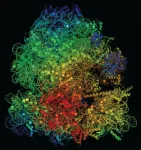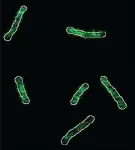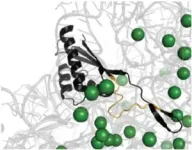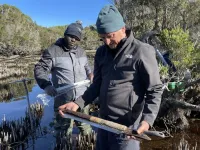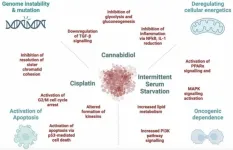(Press-News.org) Recent estimates indicate that deadly antibiotic-resistant infections will rapidly escalate over the next quarter century. More than 1 million people died from drug-resistant infections each year from 1990 to 2021, a recent study reported, with new projections surging to nearly 2 million deaths each year by 2050.
In an effort to counteract this public health crisis, scientists are looking for new solutions inside the intricate mechanics of bacterial infection. A study led by researchers at the University of California San Diego has discovered a vulnerability within strains of bacteria that are antibiotic resistant.
Working with labs at Arizona State University and the Universitat Pompeu Fabra (Spain), Professor Gürol Süel and colleagues in UC San Diego’s School of Biological Sciences investigated the antibiotic resistance of the bacterium Bacillus subtilis. Their research was motivated by the question of why mutant variants of bacteria do not proliferate and take over the population once they have developed an antibiotic-resistant advantage. With an upper hand over other bacteria lacking similar antibiotic resistance, such bacteria should become dominant. Yet they are not. Why?
The answer, reported in the journal Science Advances, is that antibiotic resistance comes at a cost. While antibiotic resistance provides some advantages for the bacteria to survive, the team discovered that it’s also linked with a physiological limitation that hinders potential dominance. This fact, the researchers note, potentially could be exploited to stop the spread of antibiotic resistance.
“We discovered an Achilles heel of antibiotic resistant bacteria,” said Süel, a member of the Department of Molecular Biology at UC San Diego. “We can take advantage of this cost to suppress the establishment of antibiotic resistance without drugs or harmful chemicals.”
Spontaneous mutations of DNA arise in all living cells, including those within bacteria. Some of these mutations lead to antibiotic resistance. Süel and his colleagues focused on physiological mechanisms related to ribosomes, the micro machines within cells that play a key role in synthesizing proteins and translating genetic codes.
All cells rely on charged ions such as magnesium ions to survive. Ribosomes are dependent upon magnesium ions since this metal cation helps stabilize their structure and function. However, atomic-scale modeling during the new research found that mutant ribosome variants that bestow antibiotic resistance excessively compete for magnesium ions with adenosine triphosphate (ATP) molecules, which provide energy to drive living cells. Mathematical models further showed that this results in a ribosome versus ATP tug-of-war over a limited supply of magnesium in the cell.
Studying a ribosome variant within Bacillus subtilis called “L22,” the researchers found that competition for magnesium hinders the growth of L22 more than a normal “wild type” ribosome that is not resistant to antibiotics. Hence the competition levies a physiological toll linked to mutant bacteria with resistance.
“While we often think of antibiotic resistance as a major benefit for bacteria to survive, we found that the ability to cope with magnesium limitation in their environment is more important for bacterial proliferation,” said Süel.
This newly discovered weakness can now be used as a target to counteract antibiotic resistance without the use of drugs or toxic chemicals. For example, it may be possible to chelate magnesium ions from bacterial environments, which should selectively inhibit resistant strains without impacting the wild type bacteria that may be beneficial to our health. “We show that through a better understanding of the molecular and physiological properties of antibiotic-resistant bacteria, we can find novel ways to control them without the use of drugs,” said Süel.
In October Süel and colleagues at the University of Chicago announced a separate approach to combating the antibacterial-resistant bacteria health crisis. Their development of a bioelectronic device that taps into the natural electrical activity of certain bacteria found on our skin paves the way for another drug-free approach to managing infections. The advancement was proven to reduce the harmful effects of Staphylococcus epidermidis, a common bacterium known for causing hospital-acquired infections and contributing to antibiotic resistance. In both studies the researchers used charged ions to control bacteria.
“We are running out of effective antibiotics and their rampant use over the decades has resulted in antibiotics being spread across the globe, from the arctic to the oceans and our groundwater,” said Süel. “Drug-free alternatives to treating bacterial infections are needed and our two most recent studies show how we can indeed achieve drug-free control over antibiotic resistant bacteria.”
The authors of the new study were: Eun Chae Moon, Tushar Modi, Dong-yeon Lee, Danis Yangaliev, Jordi Garcia-Ojalvo, S. Banu Ozkan and Gürol Süel.
END
Researchers uncover Achilles heel of antibiotic-resistant bacteria
As drug resistance surges, scientists discover a promising new way to control the spread of this public health crisis
2024-11-15
ELSE PRESS RELEASES FROM THIS DATE:
Scientists uncover earliest evidence of fire use to manage Tasmanian landscape
2024-11-15
Some of the first humans to arrive in Tasmania, over 41,000 years ago, used fire to shape and manage the landscape, a new study from The Australian National University (ANU) and the University of Cambridge has found.
It is thought to be the earliest and most detailed record of humans using fire in the Tasmanian environment.
According to the researchers, early inhabitants of Tasmania were managing forests and grasslands by burning them to create open spaces, possibly for food procurement and cultural activities.
The team analysed traces of charcoal and pollen contained in ancient mud that showed how Indigenous Tasmanians (Palawa) ...
Interpreting population mean treatment effects in the Kansas City Cardiomyopathy Questionnaire
2024-11-15
About The Study: Inferences about clinical impacts based on population-level mean treatment effects may be misleading, since even small between-group differences may reflect clinically important treatment benefits for individual patients. Results of this study suggest that clinical trials should explicitly describe the distributions of Kansas City Cardiomyopathy Questionnaire change at the patient level within treatment groups to support the clinical interpretation of their results.
Corresponding ...
Targeting carbohydrate metabolism in colorectal cancer: Synergy of therapies
2024-11-15
“This commentary will discuss what is known about such combinatorial treatments, including potential mechanisms and future protocols.”
BUFFALO, NY- November 15, 2024 – A new review was published in Volume 11 of Oncoscience on November 12, 2024, entitled, “Targeting carbohydrate metabolism in colorectal cancer - synergy between DNA-damaging agents, cannabinoids, and intermittent serum starvation.”
As highlighted by the authors in the abstract of this review, chemotherapy is a common treatment for many cancers. However, it is often ineffective for long-term patient survival and ...
Stress makes mice’s memories less specific
2024-11-15
Stress is a double-edged sword when it comes to memory: stressful or otherwise emotional events are usually more memorable, but stress can also make it harder for us to retrieve memories. In PTSD and generalized anxiety disorder, overgeneralizing aversive memories results in an inability to discriminate between dangerous and safe stimuli. However, until now, it wasn’t clear whether stress played a role in memory generalization.
Now, neuroscientists report November 15 in the Cell Press journal Cell that acute stress prevents mice from forming specific memories. Instead, the stressed mice formed generalized memories, which are ...
Research finds no significant negative impact of repealing a Depression-era law allowing companies to pay workers with disabilities below minimum wage
2024-11-15
PHILADELPHIA—Debate continues to swirl nationally on the fate of a practice born of an 86-year-old federal statute allowing companies to pay workers with disabilities subminimum wages: anything below the federal minimum wage of $7.25 an hour, but for some roles as little as 25-cents-per-hour. Those in favor of repealing this statute highlight assumptions about reduced productivity along with the unfairness of this wage level—often used elsewhere to pay, for example, food service workers who typically make additional wages in tips. Those against repeal have voiced concerns that, without subminimum ...
Resilience index needed to keep us within planet’s ‘safe operating space’
2024-11-15
EMBARGOED: NOT FOR RELEASE UNTIL FRIDAY 15 NOVEMBER 2024 AT 11:00 ET (15:00 UK TIME).
Researchers are calling for a ‘resilience index’ to be used as an indicator of policy success instead of the current focus on GDP.
They say that GDP ignores the wider implications of development and provides no information on our ability to live within our planet’s ‘safe operating space’.
In a paper published today [15 November] in the journal One Earth, researchers from the University of Southampton, UCL ...
How stress is fundamentally changing our memories
2024-11-15
Researchers at The Hospital for Sick Children (SickKids) have uncovered that stress changes how our brain encodes and retrieves aversive memories, and discovered a promising new way to restore appropriate memory specificity in people with post-traumatic stress disorder (PTSD).
If you stumble during a presentation, you might feel stressed the next time you have to present because your brain associates your next presentation with that one poor and aversive experience. This type of stress is tied to one memory. But stress from traumatic events ...
Time in nature benefits children with mental health difficulties: study
2024-11-15
A team of researchers from McGill and Université de Montréal’s Observatoire pour l’éducation et la santé des enfants (OPES, or observatory on children’s health and eduation), led by Sylvana Côté, found that spending two hours a week of class time in a natural environment can reduce emotional distress among 10- to 12-year-olds who had the most significant mental health problems before the program began.
The research comes on the heels of the publication of a UNICEF ...
In vitro model enables study of age-specific responses to COVID mRNA vaccines
2024-11-15
mRNA vaccines saved lives during the COVID-19 pandemic, but older people had less of an immune response to the vaccines than did younger adults. Why? Boston Children’s researchers, led by Byron Brook, PhD, and Ofer Levy, MD, PhD, have found some answers, while providing proof-of-concept of a new system that can model vaccine responses in a dish.
The test system, described in a paper out today in iScience, is called MEMPHIS (Modular Evaluation of immunogenicity using Multi-Platform Human In vitro Systems). It analyzes whole human blood from people of different age groups and applies both proteomics and targeted assays to measure ...
Sitting too long can harm heart health, even for active people
2024-11-15
More time spent sitting, reclining or lying down during the day may increase the risk of cardiovascular disease (CVD) and death, according to a study in JACC, the flagship journal of the American College of Cardiology, and presented at the American Heart Association’s Scientific Sessions 2024. More than roughly 10-and-a-half hours of sedentary behavior per day was significantly linked with future heart failure (HF) and cardiovascular (CV) death, even among people meeting recommended levels of exercise.
“Our findings support cutting back on sedentary time to reduce cardiovascular risk, with 10.6 hours a day marking a potentially key threshold ...
LAST 30 PRESS RELEASES:
SfN announces Early Career Policy Ambassadors Class of 2026
Spiritual practices strongly associated with reduced risk for hazardous alcohol and drug use
Novel vaccine protects against C. diff disease and recurrence
An “electrical” circadian clock balances growth between shoots and roots
Largest study of rare skin cancer in Mexican patients shows its more complex than previously thought
Colonists dredged away Sydney’s natural oyster reefs. Now science knows how best to restore them.
Joint and independent associations of gestational diabetes and depression with childhood obesity
Spirituality and harmful or hazardous alcohol and other drug use
New plastic material could solve energy storage challenge, researchers report
Mapping protein production in brain cells yields new insights for brain disease
Exposing a hidden anchor for HIV replication
Can Europe be climate-neutral by 2050? New monitor tracks the pace of the energy transition
Major heart attack study reveals ‘survival paradox’: Frail men at higher risk of death than women despite better treatment
Medicare patients get different stroke care depending on plan, analysis reveals
Polyploidy-induced senescence may drive aging, tissue repair, and cancer risk
Study shows that treating patients with lifestyle medicine may help reduce clinician burnout
Experimental and numerical framework for acoustic streaming prediction in mid-air phased arrays
Ancestral motif enables broad DNA binding by NIN, a master regulator of rhizobial symbiosis
Macrophage immune cells need constant reminders to retain memories of prior infections
Ultra-endurance running may accelerate aging and breakdown of red blood cells
Ancient mind-body practice proven to lower blood pressure in clinical trial
SwRI to create advanced Product Lifecycle Management system for the Air Force
Natural selection operates on multiple levels, comprehensive review of scientific studies shows
Developing a national research program on liquid metals for fusion
AI-powered ECG could help guide lifelong heart monitoring for patients with repaired tetralogy of fallot
Global shark bites return to average in 2025, with a smaller proportion in the United States
Millions are unaware of heart risks that don’t start in the heart
What freezing plants in blocks of ice can tell us about the future of Svalbard’s plant communities
A new vascularized tissueoid-on-a-chip model for liver regeneration and transplant rejection
Augmented reality menus may help restaurants attract more customers, improve brand perceptions
[Press-News.org] Researchers uncover Achilles heel of antibiotic-resistant bacteriaAs drug resistance surges, scientists discover a promising new way to control the spread of this public health crisis
